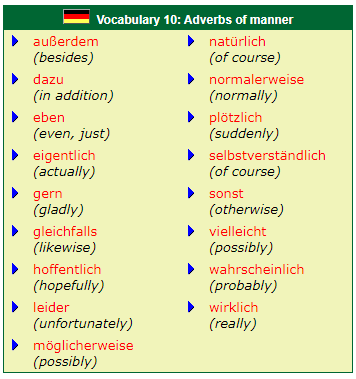Adverbs of manner
Having looked in the previous section at adverbs of time, we shall now examine the adverbs of manner which we have already encountered in this course as well as others which are in common usage in German:

Adverbs of manner with "-erweise"
"Möglicherweise" and "normalerweise" belong to a group of adverbs which are formed by adding the suffix "-erweise" to the adjective - in this case "möglich" (= possible) and "normal" (= normal). Remember that the adverb is invariable, wheras the adjective takes the appropriate adjective endings:
Heute ist ein normaler Tag.
(Today is a normal day (= adjective).)
Normalerweise essen wir um halb sieben Abendbrot.
(We normally have our evening meal at half-past six (= adverb).)
Das ist möglich.
(That is possible (= adjective).)
Möglicherweise geht er zu Fuß.
(He's possibly walking (= adverb).)
Other such adverbs include: "glücklicherweise" (= "fortunately"), "natürlicherweise" (= "naturally") and "unglücklicherweise" (= "unfortunately").
 英语
英语 日语
日语 韩语
韩语 法语
法语 西班牙语
西班牙语 意大利语
意大利语 阿拉伯语
阿拉伯语 葡萄牙语
葡萄牙语 越南语
越南语 俄语
俄语 芬兰语
芬兰语 泰语
泰语 丹麦语
丹麦语 对外汉语
对外汉语

